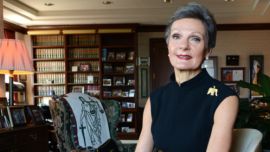Felicity Jane Bagnall Kirkwood became the first woman president of the British Hospital just over 13 months ago – it took no less than 174 years for the venerable community institution to reach this milestone.
Yet the glass ceiling had long been pierced at various levels below the very top, Kirkwood told the Times, quite apart from the nursing school always having been a female bastion ever since its foundation in 1890 by Florence Nightingale pupil Isabel Eames.
She herself had been a board member for the past decade with three other women joining her there today and, even if a minority on the board, there is a female majority in the hospital’s administration, with no less than five women among the eight directors under Director-General Angel Yebara.
Kirkwood has her hands full these weeks preparing not only for the 175th anniversary celebrations with their climax in the Teatro Colón theatre gala but also for next month’s inspection by the Joint Commission International.
The importance of the latter is difficult for people outside the sector to appreciate but it will take the institution into a new dimension as one of only a quartet of Argentine hospitals to boast this stamp of approval, which is a complex process encompassing various criteria – safety, good governance and auditability among others.
The latter criterion prompted the Times to ask about the feasibility of audit transparency, given not only the notorious accounting complexities of Argentina’s inflation-ridden economy, but also the tricky balance facing the British Hospital – nobody likes to report a loss but a nonprofit organisation should not be posting a profit either.
No easy answer there, replied Kirkwood – there is a paper loss in this year’s balance sheet but a three percent profit in real terms. Not that the Hospital likes to use the word “profit” – “margin for reinvestment” is the preferred term.
So where was that three percent reinvested, the Times then asked? In refurbishing some 700 square metres with modern infrastructure and technology up to the highest international stan - dards – pride of place given to a state of-the-art operating theatre on the second floor, as well as revamping the main operating theatre on the sixth. But not only Perdriel will benefit – the medical centres in Vicente López and Lomas de Zamora as well as downtown (Suipacha 732) will be upgraded.
The Times then asked how the British Hospital confronted a dilemma facing many hospitals between the more business-minded ‘HMO’ (health maintenance organisation) approach of recent times with traditional medical ethics and the rising costs of an increasingly specialised medicine – a tension which made itself felt at the institution a couple of decades ago.
A good mix defuses these tensions, replied Kirkwood. The board has its fair share of businessmen to bring efficiency to the table but all have their roots in the British community and ultimately seek what is best for the Hospital – she pays tribute to all members from Vice-President Alan Arntsen downwards for their hands-on commitment. The eight directors under Yebara are evenly divided between health professionals and other areas of technical expertise. Despite all the medical advances (with their spiral of costs) the human touch remains vital, says the British Hospital’s president, quoting a study mentioned at last month’s Annual General Meeting showing that doctors still diagnose cancer more accurately than artificial intelligence. The médico de cabecera (general practitioner) remains an invaluable filter for quality care at the hospital.
Another year for the British Hospital but also a very special year, with the first woman president and, above all, the 175th anniversary. Dating all the way back to the pre-Constitution, pre-railway Argentina of 1844, the hospital looks to the future in a world changing at incalculable speed – an Argentine institution with British values.




















Comments